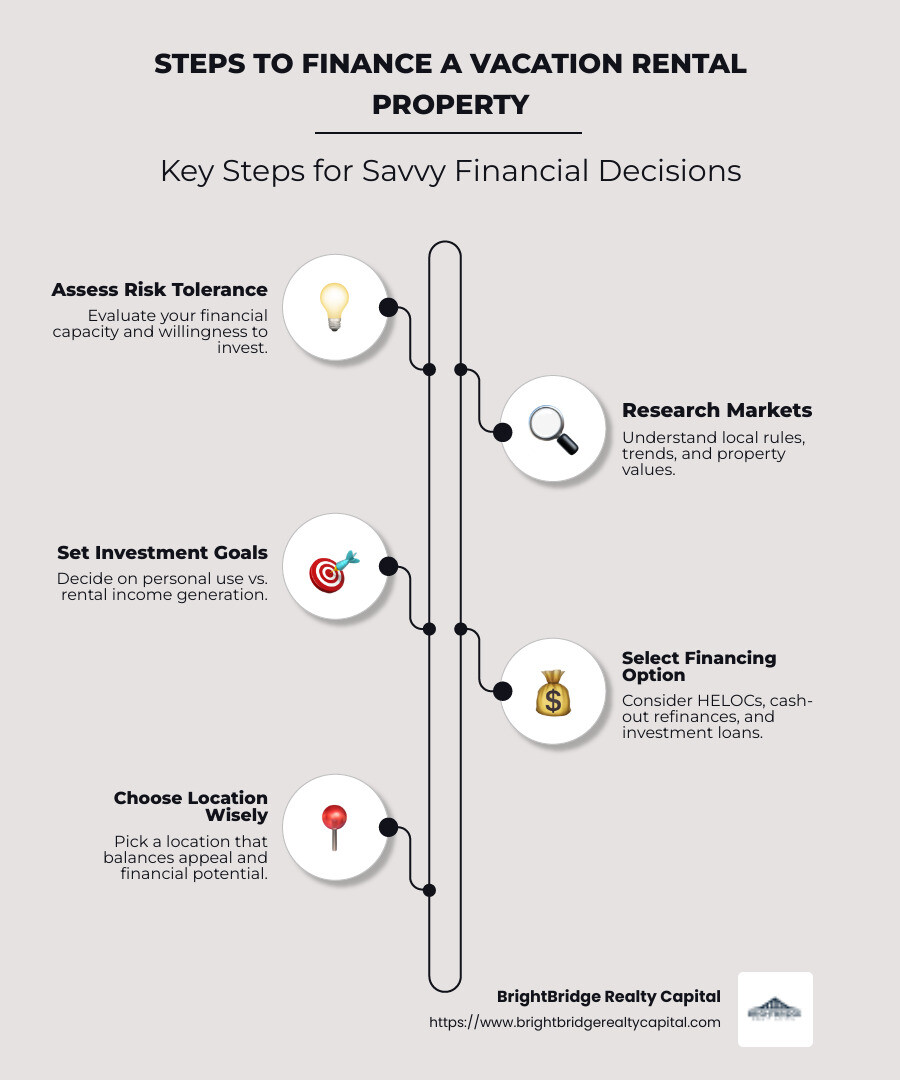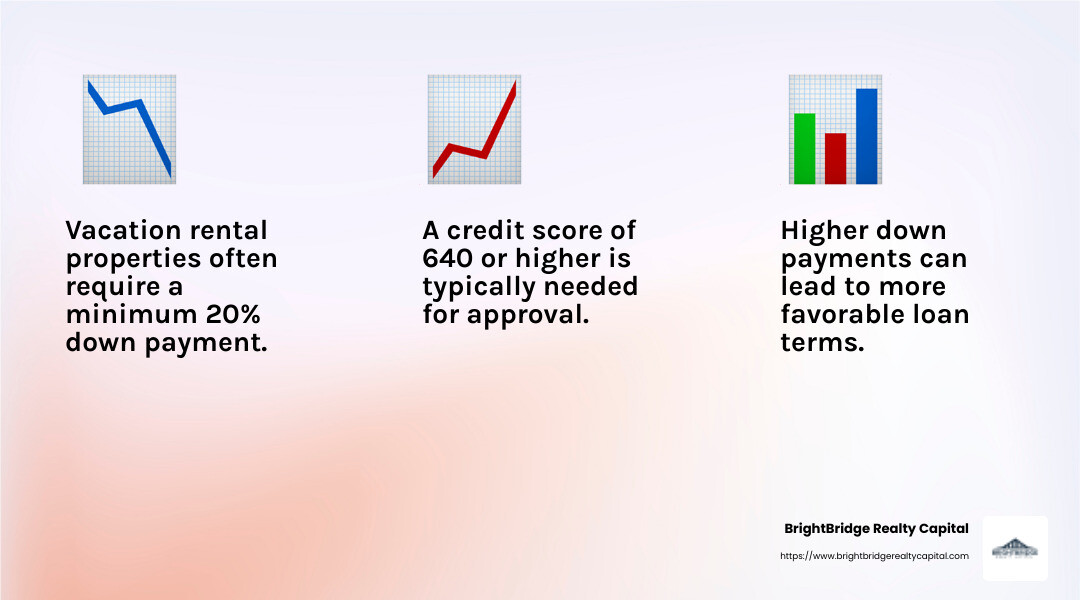Escape Plan: Financing Your Vacation Rental Property

How to finance a vacation rental property can often sound more complex than it actually is. Financing a vacation rental involves exploring several flexible and efficient options custom to real estate investors' needs. Here’s a quick overview:
- Assess Your Risk Tolerance: Decide how much you can invest without straining personal finances.
- Research Markets: Understand local regulations, market trends, and property values.
- Set Clear Investment Goals: Determine whether the focus is personal use or generating rental income.
- Choose the Right Financing Option: Consider HELOCs, cash-out refinances, and investment property loans.
Investing in a vacation rental property isn't just about choosing a beautiful location—though that certainly helps. It's a balancing act of understanding the financial landscape, setting realistic goals, and knowing your risk comfort level. This guide aims to simplify the process and empower you to make savvy financial decisions.

How to finance a vacation rental property terminology:
Understanding Vacation Rental Financing
When it comes to financing a vacation rental property, understanding the essential components like down payment, credit score, and loan types can set you on the right path. Let's break these down to make the process as straightforward as possible.
Down Payment
For vacation rental properties, lenders typically require a larger down payment compared to primary residences. A 20% down payment is often the minimum, but putting down more can improve your chances of securing a loan with favorable terms. Why? Because a larger down payment reduces the lender's risk, which can lead to lower interest rates for you.
Pro Tip: Consider making a higher down payment if you want to lower your monthly payments and increase your equity in the property from the start.
Credit Score
Your credit score is a critical factor in the financing process. For vacation rentals, lenders usually expect a higher credit score than they do for primary homes. A score of 640 or higher is often required. The better your credit score, the more likely you are to get approved for a loan with better terms.

Remember: A good credit score not only increases your chances of loan approval but can also help you secure a lower interest rate, saving you money in the long run.
Loan Types
When it comes to loan types, you have several options to consider:
Conventional Loans: These are traditional mortgage loans offering competitive interest rates and terms. They usually require a strong credit history and a substantial down payment.
Asset-Based Loans: These loans use the property itself as collateral rather than focusing on your income. They can be a good option for those who might not have a high income but have significant assets.
HELOC (Home Equity Line of Credit): If you already own property, you might use the equity in your existing home to finance your vacation rental. This can often provide more flexible terms.
Investment Property Loans: Specifically designed for rental properties, these loans take into account the potential rental income of the property, which can help you qualify more easily.
Each loan type has its pros and cons, so it's crucial to weigh them against your financial situation and investment goals.
Understanding these elements of vacation rental financing can make the process much more manageable. By being informed, you can choose the best options that align with your investment strategy and financial situation.
Next, we'll dive into the key considerations for financing, where we'll explore tax implications, property management, and more.
How to Finance a Vacation Rental Property
When you're ready to invest in a vacation rental property, you'll find several financing options at your disposal. Let's explore three popular methods: HELOC, cash-out refinance, and investment property loans. Each has its own benefits and challenges, so understanding them can help you make the best choice for your situation.
Home Equity Line of Credit (HELOC)
A HELOC allows you to tap into the equity of your primary residence to finance your vacation rental. Think of it as a credit card where your home is the collateral.
Key Advantages:
- Flexibility: You can borrow as much or as little as you need, up to your credit limit.
- Interest Rates: Often lower than other forms of credit because they're secured by your home.
Considerations:
- Variable Rates: Most HELOCs have variable interest rates, which means your payment could increase over time.
- Risk: Your home is collateral, so if you miss payments, you risk losing it.
Cash-Out Refinance
With a cash-out refinance, you replace your current mortgage with a new one, borrowing more than you owe and taking the difference in cash. This option is popular for those looking to use their existing home equity to buy another property.
Benefits:
- Lower Rates: Often better interest rates than personal loans or credit cards.
- Consolidation: Combines your existing mortgage with the new loan, simplifying your payments.
Drawbacks:
- Higher Monthly Payments: Your new mortgage could have a higher balance, increasing your monthly payments.
- Closing Costs: Be prepared for closing costs, which can add up quickly.
Investment Property Loans
These loans are custom specifically for rental properties, considering the income potential of the property itself.
Pros:
- Income Consideration: Lenders may factor in the rental income potential of the property, which can help you qualify more easily.
- Fixed Rates: Many investment property loans offer fixed interest rates, providing stability in your budgeting.
Cons:
- Higher Down Payment: Typically requires a 20% down payment, though some lenders might accept as low as 15%.
- Interest Rates: Generally higher than those for primary residences.
Choosing the right financing option depends on your financial goals, risk tolerance, and the specifics of the vacation rental property you're eyeing. By understanding these options—HELOC, cash-out refinance, and investment property loans—you can make a well-informed decision that aligns with your investment strategy.
Next, we’ll dive into the key considerations for financing, where we'll explore tax implications, property management, and more.
Key Considerations for Financing
When you're diving into vacation rental properties, there are some key considerations you must keep in mind. These include tax implications, property management, and risk tolerance. Understanding these factors can make the difference between a profitable investment and a financial headache.
Tax Implications
Owning a vacation rental property comes with its own set of tax rules. The IRS considers a second home as an investment property if you rent it out for most of the year. This classification affects how you report rental income and what expenses you can deduct.
Rental Income: You need to report all rental income on your tax return. However, if you rent your property for fewer than 15 days a year, you may not need to report the income.
Deductions: You can deduct expenses like mortgage interest, property taxes, and maintenance costs. However, these deductions are only available for the portion of the year the property is rented out.
Understanding these tax implications can help you plan better and avoid surprises come tax season.
Property Management
Managing a vacation rental can be a full-time job. You need to decide whether you'll manage the property yourself or hire a property management company.
Self-Management: If you're hands-on, you can save on management fees but be prepared for tasks like tenant screening, maintenance, and handling emergencies.
Professional Management: Hiring a property manager can take the load off your shoulders. They typically charge 8% to 12% of the rental income, but they handle everything from tenant relations to repairs.
Choosing the right property management strategy can impact your overall profitability and peace of mind.
Risk Tolerance
Investing in a vacation rental property isn't without risks. You need to assess your risk tolerance before diving in.
Market Fluctuations: Real estate markets can change. Consider how much risk you're willing to take if property values drop or if there's a decrease in rental demand.
Financial Cushion: It's wise to have a financial cushion to cover unexpected expenses like repairs or a sudden vacancy.
Personal Investment: Using your life savings for a down payment is risky. It's crucial to evaluate how much you're willing to invest without jeopardizing your financial stability.
Understanding your risk tolerance will help you make informed decisions and choose the financing option that aligns with your comfort level.

By considering these factors—tax implications, property management, and risk tolerance—you'll be better prepared to steer the complexities of financing a vacation rental property. Next, we'll explore the top financing options for vacation rentals, including HELOCs, conventional loans, and investment loans.
Top Financing Options for Vacation Rentals
When considering how to finance a vacation rental property, you'll find that there are several popular options to explore. Let's break down the main choices: HELOCs, conventional loans, and investment loans.
Home Equity Line of Credit (HELOC)
A HELOC is a flexible way to tap into the equity of your primary home to finance a vacation rental. Think of it as a credit card with your home as collateral. You can borrow up to a certain limit, usually around 80% to 90% of your home's value, minus your mortgage balance.
Pros:
- Flexibility in borrowing only what you need.
- Interest rates can be lower than other loans.
- You don't need to refinance your primary mortgage.
Cons:
- Variable interest rates can fluctuate.
- Your primary home is at risk if you default.
- Not all lenders offer HELOCs for investment properties.
Conventional Loans
Conventional loans are another route to finance your vacation rental. These are traditional mortgages not backed by the government, often with competitive interest rates.
Pros:
- Typically offer lower interest rates than investment loans.
- Fixed-rate options provide predictable monthly payments.
- Suitable for those with strong credit scores.
Cons:
- Requires a higher down payment, often 20%.
- Stricter credit and income requirements.
- May not be ideal if the property won't generate immediate income.
Investment Property Loans
Investment loans are custom for properties intended to generate income. They can be a solid choice if you're planning to rent out your vacation home regularly.
Pros:
- Designed specifically for income-generating properties.
- Lenders may consider the potential rental income.
- Can offer flexible terms based on your investment strategy.
Cons:
- Generally require a larger down payment, usually 15% to 20%.
- Interest rates are typically higher than conventional loans.
- Strict credit score and debt-to-income ratio requirements.
Choosing the right financing option depends on your financial situation and investment goals. By understanding the pros and cons of each, you can make an informed decision that aligns with your needs.
Next, we'll dive into some frequently asked questions about financing vacation rentals, including the best ways to finance these properties and how interest rates compare to those for primary residences.
Frequently Asked Questions about Financing Vacation Rentals
What is the best way to finance a vacation rental property?
When it comes to financing a vacation rental property, the best method depends on your financial situation and goals.
Conventional Loans: These are a popular choice if you have a strong credit score and can afford a 20% down payment. They offer competitive interest rates and fixed payment schedules, making budgeting easier.
Investment Property Loans: Custom specifically for rental properties, these loans consider potential rental income. However, they often come with higher interest rates and require a larger down payment.
HELOCs: If you have significant equity in your primary home, a Home Equity Line of Credit can be a flexible option. It allows you to borrow as needed, but your home is at risk if you default.
How do interest rates for vacation rentals compare to primary residences?
Interest rates for vacation rentals are typically higher than those for primary residences. Lenders view these as riskier investments because, in financial hardship, borrowers are more likely to default on a vacation home than their primary residence.
Conventional Loans: While they offer lower rates than investment loans, they still tend to be above those for primary homes.
Investment Property Loans: These often have the highest rates due to the added risk of rental income fluctuations.
What are the tax implications of owning a vacation rental?
Owning a vacation rental comes with specific tax considerations:
Rental Income: Any income you earn from renting out your property is taxable. Keep detailed records of all rental-related income and expenses for accurate reporting.
Deductions: You can deduct expenses like mortgage interest, property taxes, and maintenance costs. If you rent the property for fewer than 15 days a year, you might not need to report the income, but this can limit your deductions.
Depreciation: You can also depreciate the property over time, which can help offset rental income on your tax return.
Understanding these tax implications can help you maximize your investment returns and ensure compliance with IRS regulations.
Next, we'll wrap up with how BrightBridge Realty Capital can provide customized solutions and fast closings for your vacation rental financing needs.
Conclusion
Financing a vacation rental property can be a complex journey, but with the right partner by your side, it becomes much more manageable. At BrightBridge Realty Capital, we specialize in providing customized solutions custom to your unique needs. Whether you're a seasoned investor or just starting out, our expertise and resources are here to guide you.
One of our standout features is our ability to offer fast closings. We understand that time is of the essence in real estate investing. That's why we pride ourselves on our ability to close deals often within a week. Our direct lending approach eliminates intermediaries, ensuring a smooth and efficient process from start to finish.
Our nationwide presence, including our location in New York, NY, allows us to support investors across the country with flexible and reliable financing options. With competitive rates and a seamless process, we are committed to helping you achieve your investment goals.
Ready to take the next step in your real estate journey? Explore our customized real estate financing solutions and see how BrightBridge Realty Capital can help you succeed.


